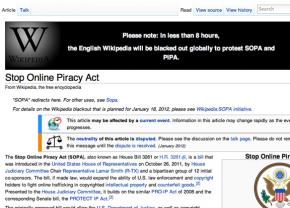A law to censor the Internet
and report on a corporate drive against Internet freedom.
AN ENSEMBLE of corporate interests and national leaders of both mainstream parties have teamed up to push for legislation that would give the federal government greater powers to censor the Internet.
The Stop Online Piracy Act (SOPA) introduced in the House and the corresponding Protect IP Act (PIPA) in the Senate would require websites to act as cops to prevent users from posting copyrighted material. If a site fails to censor such material, some of the biggest corporations in the country could go to the Justice Department and get whole sites shut down.
The implications are clear, not only for giant websites like Facebook and Twitter, but any site where people can post text, music or video, or even just links to other sites. That's why the social news referrer site Reddit, the online encyclopedia Wikipedia and other sites are participating in a 24-hour blackout January 18--to dramatize the impact these laws could have if they go through.
Multinational corporations banded together in the Motion Picture Association of America and the Recording Industry Association of America are pushing hard for SOPA.

Websites are already required by law to remove user-posted content that is copyrighted. But as Dean Baker wrote at Alternet.org, SOPA would require sites to "pre-emptively screen material for potential infringements. If they fail, they risk having their whole site taken down for a period of time, in addition to paying damages to copyright holders."
The U.S. Department of Justice would be empowered to shut down sites if it finds that claims made by, say, Time Warner or Viacom are valid. The Feds could also order banks and financial firms not to process payments to websites for online advertising--or prevent a site's content from showing up in search engines like Google.
As scientist Michael Ham pointed out in an article about how the proposed laws could restrict academic debate, SOPA would "provide a rapid way to sentence websites to death without the need for pesky things like judges and juries."
The aim of the legislation is to get websites big and small to police user-generated content for copyright violations--for free, at the behest of mostly major media conglomerates. That's why Dean Baker was right to refer to SOPA "class war" being extended to the Internet:
The question that serious people would ask is what problem is the SOPA intended to address? There is still plenty of money being made by online distributors of music, movies, books and software. The problem seen by the top executives at Disney and the other promoters of the SOPA is that they want to make more.
A substantial amount of copyright-protected material does slip through the system, as does an even larger amount of material with ambiguous copyright status, such as a homemade video with parts of a copyrighted song or material whose copyright may have expired. The big entertainment companies want to impose large costs on web intermediaries (which will be passed on to consumers) and make it more difficult for people to gain access to totally open material, in order to make them pay more money for their copyright-protected material.
SUPPORTERS OF the legislation say it's needed to stop piracy and save the jobs of those who produce the video and music under copyright. But this is just another in a long line of desperate measures, dating back to the days of the Napster file-sharing website, that an aging media industry has demanded in the hopes of making an extra buck off something they can't control anymore.
As many musicians point out, the music industry's primary interest in enforcing copyright laws isn't to make sure the artists get paid--in fact, they are usually paid as little as possible--but to increase corporate profits.
If SOPA is passed, it could break the Internet. Copyright infringement claims and counter-claims could shut down whole websites, freedom of discussion and debate on the Web would be restricted, and a precedent would be set for the Justice Department to censor the Internet for other reasons.
Criticism of SOPA has come from many quarters, which forced the Obama administration to release a statement hinting it doesn't support the legislation: "While we believe that online piracy by foreign websites is a serious problem that requires a serious legislative response, we will not support legislation that reduces freedom of expression, or undermines the dynamic, innovative global Internet."
Then again, this is from the same president who said he wouldn't sign the National Defense Authorization Act, with its unconstitutional provision allowing indefinite detention of U.S. citizens. Even if SOPA and PIPA are shelved in their current forms, we can expect Corporate America to push similar measures in the future--so this won't be the last time we'll need to stand up for Internet freedom.


